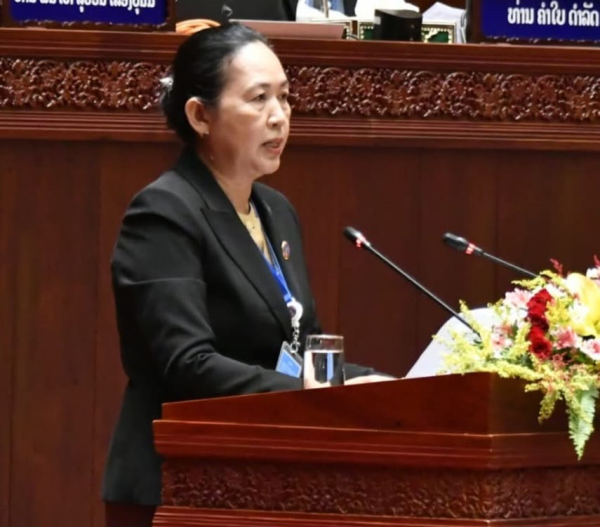KPL
The National Assembly (NA) has proposed a series of sweeping reforms to improve oversight, planning, and regulation of Laos’ energy sector. The proposals were presented during the 9th Ordinary Session of the 9th Legislature, held on June 12 and chaired by Mr. Sommat Phonsena, Vice President of the National Assembly.

(KPL) The National Assembly (NA) has proposed a series of sweeping reforms to improve oversight, planning, and regulation of Laos’ energy sector. The proposals were presented during the 9th Ordinary Session of the 9th Legislature, held on June 12 and chaired by Mr. Sommat Phonsena, Vice President of the National Assembly.
Delivering the proposal, Ms. Pingkham Latsasima, Member of the Party Central Committee, Member of the National Assembly Standing Committee, and Chairwoman of the Committee for Economy, Technology and Environment, outlined a strategic vision for energy sector development that emphasizes sustainability, transparency, and national benefit.
All electricity investment project contracts—whether already signed, under negotiation, or pending approval—should be reassessed. Clear delineation of responsibilities between central and local authorities is essential, with full engagement from all relevant sectors.
Energy projects must include comprehensive assessments of environmental, social, and community impacts. Key measures include fair compensation, reforestation, livelihood restoration, and greater involvement of affected communities to enhance their quality of life.
Projects that remain undeveloped or are operating outside legal frameworks will face firm action. The aim is to safeguard national interests and ensure responsible investment practices.
Financial monitoring of energy developers will be tightened to ensure compliance with laws and contracts. The proposal also calls for reducing unnecessary tax exemptions and delays in financial obligations.
A revision of profit tax rates for renewable energy projects, such as solar and wind, was proposed to better reflect project lifespans and increase state revenue.
Future electricity development will be aligned with socio-economic needs, prioritizing energy security, reducing reliance on imports, and encouraging domestic energy investment.
A full review and reform of energy-related laws is planned to match the pace of national development. The goal is to ensure legal clarity, stronger coordination, and accountability across the sector.
The proposal reflects a forward-looking vision for a sustainable, well-regulated energy sector. If adopted, it promises stronger public participation, improved environmental safeguards, and enhanced benefits for the Lao people through better governance and increased revenue generation.
KPL